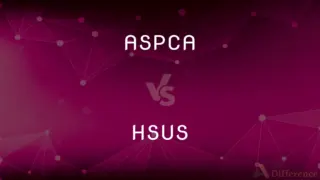TV vs. TS — What's the Difference?
Edited by Tayyaba Rehman — By Fiza Rafique — Published on December 9, 2023
TV (Television) is a device displaying visual content with audio. TS (Transport Stream) is a digital container format for transmitting audio, video, and data in broadcast systems.

Difference Between TV and TS
Table of Contents
ADVERTISEMENT
Key Differences
TV, or Television, is a well-known device used worldwide to view visual content accompanied by audio. TS, on the other hand, stands for Transport Stream, a digital container format primarily employed for broadcast purposes.
While TV has become a staple in homes, serving as an entertainment medium for news, movies, and shows, TS functions behind the scenes. TS ensures that audio, video, and data are efficiently transmitted across various broadcast systems.
The appeal of TV lies in its content presentation. TVs offer programs, advertisements, live events, and more. TS, being a format, is not directly consumed by viewers. Instead, it plays a crucial role in how data gets packaged and transmitted to TVs and other devices.
Modern TVs, given technological advancements, can decode and play TS files, ensuring broadcast content is delivered without hitches. However, TS files themselves require specific software or devices to be decoded if one were to access them directly.
In essence, while both TV and TS revolve around the world of broadcast and entertainment, their functions differ significantly. TV is the end medium where audiences view content, while TS is a technical means ensuring content gets to its destination effectively.
ADVERTISEMENT
Comparison Chart
Primary Function
Display visual content with audio
Digital container for transmitting data
Audience Interaction
Directly consumed by viewers
Not directly consumed; operates in the background
Usage Scenario
Homes, offices, public spaces
Broadcast systems, multimedia transmission
Associated Content
Movies, shows, news, live events
Encapsulated audio, video, and data packets
Dependence
Can decode and display TS files with appropriate technology
Relies on devices, including TVs, to decode and present its content to end-users
Compare with Definitions
TV
A system of transmitting moving images with sound.
Before the digital era, TV broadcasts were often analog.
TS
A method to encapsulate packetized streams.
For error-free transmission, they used the TS method over other formats.
TV
A primary source of entertainment in households.
Every evening, the family gathers around the TV to watch a movie.
TS
A container for audio, video, and data in broadcast systems.
The TS file contained all the essential data packets for the live event.
TV
A cultural phenomenon influencing opinions and lifestyles.
Many fashion trends are popularized through TV celebrities.
TS
A standard for MPEG (Moving Picture Experts Group) broadcast.
The broadcaster adhered to the MPEG TS standard for high-quality transmission.
TV
A medium for broadcasting programs to the public.
The breaking news was immediately aired on all major TV channels.
TS
A digital format for transmitting multimedia content.
The broadcast used a TS format to ensure smooth transmission.
TV
An electronic device for visual and audio content display.
She bought a new TV to watch her favorite shows in high definition.
TS
A technical means for efficient data broadcast.
To avoid glitches during the live show, they chose TS for data packaging.
TV
Television
What's on TV?.
TS
Plural of t
TV
A television
She bought a new TV.
TS
Initialism of temperature-sensitive
TV
Alternative form of TV
TV
Broadcasting visual images of stationary or moving objects;
She is a star of screen and video
Television is a medium because it is neither rare nor well done
TV
A receiver that displays television images;
The British call a tv set a telly
Common Curiosities
Is TS only related to television broadcasting?
While commonly used in TV broadcasting, TS is also used in other multimedia transmission scenarios.
Can a TV play TS files directly?
Modern TVs with appropriate decoders can play TS files directly.
What does TV stand for?
TV stands for Television.
Are all TV broadcasts delivered in TS format?
No, but TS is a prevalent format for many digital broadcasts.
Can I view TS files on my computer?
Yes, with the right software, you can view TS files on a computer.
Can I convert TS files to other formats?
Yes, there are software tools that can convert TS files to other multimedia formats.
What is the primary use of TS?
TS is used for transmitting audio, video, and data in broadcast systems.
How has TV evolved over the years?
TV has evolved from black and white, to color, to HD, and now to 4K and beyond.
What is the difference between TS and MP4?
Both are container formats, but TS is designed for broadcasting, while MP4 is more versatile for various media.
Why is TS preferred in broadcasting?
TS efficiently packages audio, video, and data, ensuring consistent broadcast quality.
How can I edit TS files?
You'd need specialized software to edit TS files, and often it's easier to convert them to another format first.
Do all TVs support HD content?
Not all, but most modern TVs support HD and even higher resolutions.
Are smart TVs the latest in TV technology?
Smart TVs, which connect to the internet and run apps, are popular, but there are newer technologies like OLED and QLED TVs.
How is TS related to MPEG?
TS is a standard format defined by MPEG for broadcasting.
Do I need a special antenna for digital TV signals?
While many antennas can receive digital signals, some are optimized for digital TV reception.
Share Your Discovery

Previous Comparison
ASPCA vs. HSUS
Next Comparison
Purchase Requisition vs. Purchase OrderAuthor Spotlight
Written by
Fiza RafiqueFiza Rafique is a skilled content writer at AskDifference.com, where she meticulously refines and enhances written pieces. Drawing from her vast editorial expertise, Fiza ensures clarity, accuracy, and precision in every article. Passionate about language, she continually seeks to elevate the quality of content for readers worldwide.
Edited by
Tayyaba RehmanTayyaba Rehman is a distinguished writer, currently serving as a primary contributor to askdifference.com. As a researcher in semantics and etymology, Tayyaba's passion for the complexity of languages and their distinctions has found a perfect home on the platform. Tayyaba delves into the intricacies of language, distinguishing between commonly confused words and phrases, thereby providing clarity for readers worldwide.














































